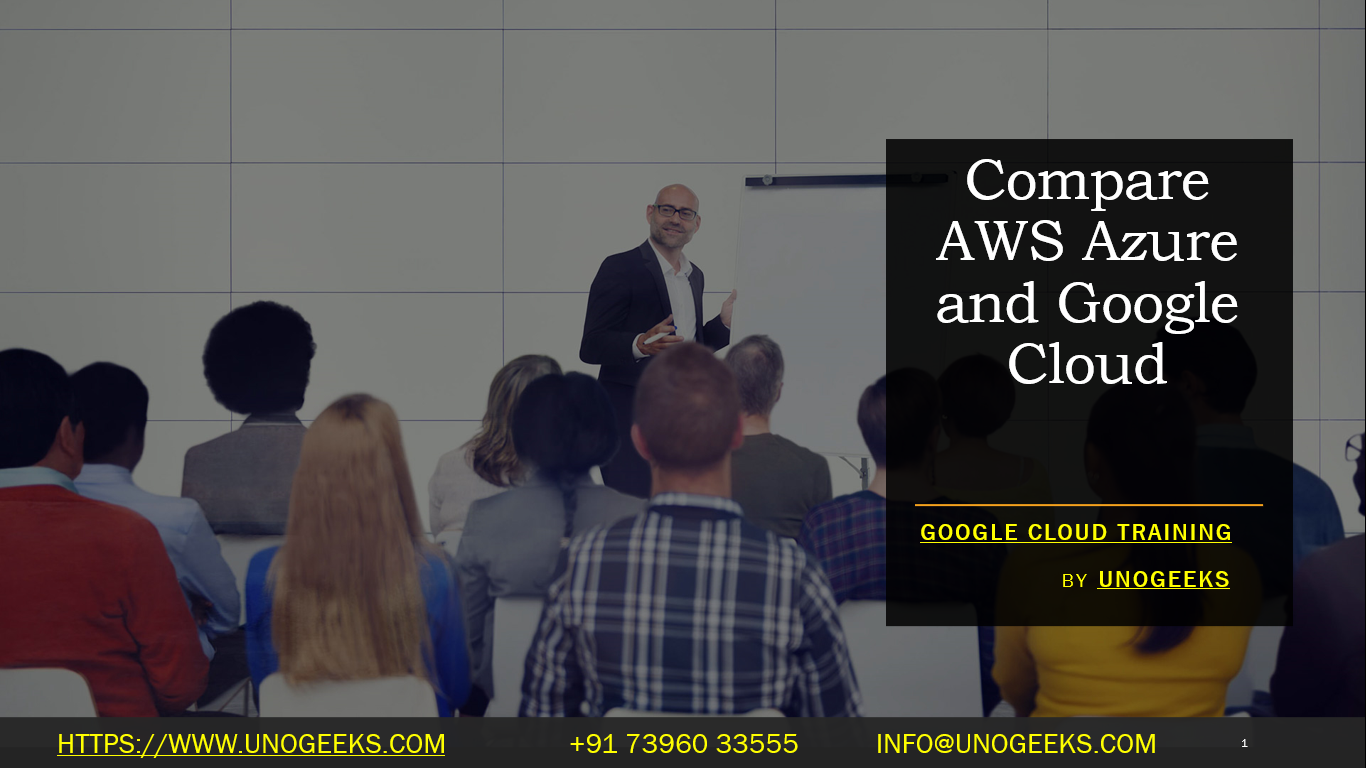Compare AWS Azure and Google Cloud
Comparing AWS (Amazon Web Services), Azure (Microsoft Azure), and Google Cloud Platform (GCP) is a complex task, as each cloud provider offers a wide range of services and features. The choice between them depends on your specific requirements, preferences, and existing technology stack. Here’s a high-level comparison of the three major cloud providers:
Market Share and Global Reach:
AWS: AWS is the largest cloud provider by market share and has a global presence with data centers in multiple regions worldwide.
Azure: Azure is the second-largest cloud provider and has a strong global presence, with data centers in many regions.
GCP: GCP is the third-largest cloud provider, with data centers in numerous regions and a growing global footprint.
Services and Ecosystem:
AWS: AWS offers a vast and mature ecosystem of services, including computing, storage, databases, analytics, machine learning, IoT, and more. It is known for its wide range of offerings and flexibility.
Azure: Azure provides a comprehensive set of services, especially well-integrated with Microsoft products. It includes services for AI, analytics, IoT, and more. Azure’s strength lies in hybrid cloud solutions.
GCP: GCP offers a strong set of services with a focus on data analytics, machine learning, and container management. It is known for its data and AI capabilities, including BigQuery and TensorFlow.
Compute Services:
AWS: AWS Elastic Compute Cloud (EC2) offers a wide range of instance types for virtual machines. It also provides serverless computing with AWS Lambda.
Azure: Azure Virtual Machines (VMs) provide scalable compute resources, and Azure Functions offer serverless computing.
GCP: Google Compute Engine provides VMs, and Cloud Functions offer serverless compute.
Container Orchestration:
AWS: Amazon Elastic Kubernetes Service (EKS) for Kubernetes orchestration.
Azure: Azure Kubernetes Service (AKS) for Kubernetes.
GCP: Google Kubernetes Engine (GKE) for Kubernetes, known for its strong Kubernetes support.
Databases and Data Services:
AWS: Offers Amazon RDS, Aurora, DynamoDB, and Redshift for databases. Also provides Amazon S3 for object storage.
Azure: Provides Azure SQL Database, Cosmos DB, and Azure Data Warehouse. Azure Blob Storage is for object storage.
GCP: Offers BigQuery for analytics, Cloud SQL for databases, and Cloud Bigtable for NoSQL. Cloud Storage is for object storage.
AI and Machine Learning:
AWS: AWS offers Amazon SageMaker, Rekognition, Comprehend, and more AI/ML services.
Azure: Provides Azure Machine Learning, Azure Cognitive Services, and more.
GCP: Known for strong AI and ML capabilities, including TensorFlow, AI Platform, and Vision AI.
DevOps and Management Tools:
AWS: AWS CodePipeline, CodeBuild, CloudFormation for infrastructure as code (IaC).
Azure: Azure DevOps, Azure Resource Manager (ARM) for IaC.
GCP: Google Cloud Build, Deployment Manager for IaC.
Hybrid Cloud and Edge Computing:
AWS: Offers AWS Outposts for hybrid cloud and AWS Wavelength for edge computing.
Azure: Azure Arc for hybrid cloud management and Azure Edge Zones for edge computing.
GCP: Provides Anthos for hybrid and multi-cloud management and Google Edge for edge computing.
Pricing:
AWS: Offers pay-as-you-go pricing with various pricing models and cost management tools.
Azure: Provides flexible pricing options, including pay-as-you-go, reserved instances, and hybrid benefits for Windows Server.
GCP: Offers transparent pricing with sustained use discounts and committed use contracts.
Certifications and Support:
AWS: Offers a wide range of certifications and support plans.
Azure: Provides certifications and various support plans, including Azure DevOps.
GCP: Offers certifications and multiple support tiers.
Popularity and Community:
AWS: The largest and most mature cloud provider with a large user base and community.
Azure: Strong enterprise adoption and integration with Microsoft products.
GCP: Known for its innovative services and strong data and AI capabilities.
In summary, each cloud provider has its strengths and weaknesses, and the choice depends on your specific needs. Consider factors like existing technology stack, geographical presence, service offerings, and pricing when making a decision. Many organizations also adopt a multi-cloud or hybrid cloud strategy to leverage the strengths of multiple providers.
Google Cloud Training Demo Day 1 Video:
Conclusion:
Unogeeks is the No.1 IT Training Institute for Google Cloud Platform (GCP) Training. Anyone Disagree? Please drop in a comment
You can check out our other latest blogs on Google Cloud Platform (GCP) here – Google Cloud Platform (GCP) Blogs
You can check out our Best In Class Google Cloud Platform (GCP) Training Details here – Google Cloud Platform (GCP) Training

———————————-
For Training inquiries:
Call/Whatsapp: +91 73960 33555
Mail us at: info@unogeeks.com
Our Website ➜ https://unogeeks.com
Follow us:
Instagram: https://www.instagram.com/unogeeks
Facebook: https://www.facebook.com/UnogeeksSoftwareTrainingInstitute
Twitter: https://twitter.com/unogeeks
